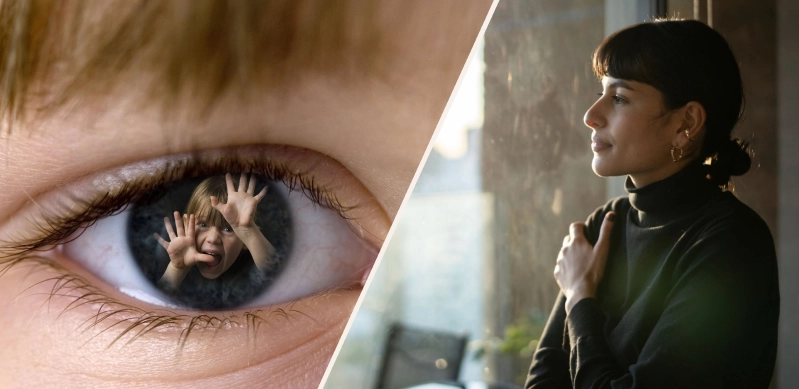
The impact of childhood trauma on adult mental health is often underestimated, yet for many, painful early experiences echo throughout their lives in the form of anxiety, depression, or difficulties in relationships.
Whether it’s physical or emotional abuse, neglect, witnessing violence, or growing up in a volatile environment, childhood trauma can cast a long and dark shadow over a person’s mental health well into adulthood.
In this blog, we will explore the effects of childhood trauma on adult mental health and look into the potential pathways toward healing.
What Is Trauma?
Trauma refers to an emotional or psychological response to an event or series of events that are distressing or disturbing. These events are often overwhelming and can have a profound impact on an individual’s mental and emotional well-being.
Trauma can result from a wide range of experiences, including but not limited to:
Physical harm or injury: This includes accidents, natural disasters, or any event causing bodily harm.
Emotional or psychological distress: Trauma can arise from experiences such as abuse, neglect, or witnessing violence.
Loss or grief: The death of a loved one, the end of a significant relationship, or other forms of loss can be traumatic.
War or combat: Military personnel and civilians exposed to the horrors of war can experience trauma.
Medical trauma: Serious illnesses, surgeries, or medical procedures can be traumatic for some individuals.
Natural disasters: Earthquakes, floods, hurricanes, and other catastrophic events can lead to trauma.
Trauma is a deeply subjective experience, and individuals may react differently to similar events. Responses to trauma can be immediate or delayed, and they may manifest in various ways, such as flashbacks, nightmares, anxiety, depression, and a heightened startle response.
The Complex Impact of Childhood Trauma
Childhood trauma can have multifaceted consequences on an individual’s mental health, often resulting in long-lasting emotional, psychological, and behavioral patterns. These effects can manifest in various forms, including anxiety, depression, post-traumatic stress disorder (PTSD), substance abuse, self-harm, and even personality disorders. However, the following are the symptoms of childhood trauma in adulthood:
1. Mental Health Disorders:
Childhood trauma can significantly increase the risk of developing mental health disorders later in life. Studies have shown a strong correlation between adverse childhood experiences (ACEs) and conditions such as depression, anxiety disorders, and suicidal ideation. The stress and unresolved emotions from traumatic events can disrupt brain development, leading to difficulties in emotional regulation and an increased vulnerability to mental health issues.
2. Emotional Dysregulation:
Childhood trauma can leave a lasting impact on a person’s ability to regulate their emotions effectively. This may result in emotional volatility, difficulty in managing stress and anxiety, and a heightened sensitivity to triggers associated with the traumatic experience. Individuals who experience trauma as children may struggle with constant feelings of fear, shame, and low self-esteem, hindering their overall mental well-being.
3. Relationship Challenges:
Trauma experienced during childhood can profoundly affect an individual’s ability to form and sustain healthy relationships. Trust issues, fear of intimacy, and difficulties in establishing secure attachments are common challenges among those who have endured childhood trauma. These struggles can lead to isolation, dysfunctional relationships, and a reinforced belief that they are unworthy of love or support.
4. Coping Mechanisms and Maladaptive Behaviors:
To cope with the overwhelming emotional pain, individuals who have experienced childhood trauma may develop maladaptive coping mechanisms. Substance abuse, self-harm, disordered eating patterns, and engaging in risky behaviors can serve as temporary relief or distractions from the distressing memories. Unfortunately, these coping strategies often exacerbate the deep-rooted trauma and create a cycle of self-destructive behavior.
How to Heal from Childhood Trauma?
Although the effects of childhood trauma can be long-lasting, it is essential to recognize that healing is possible. Breaking the cycle requires a combination of therapeutic interventions, support systems, and self-compassion.
1. Therapy and Counseling:
Trauma-focused therapy, such as cognitive-behavioral therapy (CBT), eye movement desensitization and reprocessing (EMDR), or dialectical behavior therapy (DBT), can help individuals process and make sense of their traumatic experiences. These evidence-based approaches aim to address the emotional, cognitive, and behavioral effects of the trauma, providing tools for healing and resilience.
2. Building Support Networks:
Establishing a strong support network of trusted family members, friends, or support groups can play a crucial role in healing from childhood trauma. Sharing experiences with empathetic individuals who can offer validation, understanding, and unconditional support can facilitate the journey toward recovery.
3. Self-Care and Self-Compassion:
Engaging in self-care practices, such as mindfulness, exercise, journaling, or engaging in creative outlets, can help individuals reconnect with their inner selves and promote healing. Practicing self-compassion and forgiveness is also vital in letting go of self-blame and realizing that the trauma experienced was not their fault.
Conclusion
The effects of childhood trauma on adult mental health cannot and should not be underestimated. It is crucial to raise awareness and provide appropriate support systems for those who have endured childhood trauma. By recognizing the impact of these experiences, offering interventions, and creating safe environments, we can empower individuals to heal, break the cycle, and reclaim their mental well-being.
Remember, the shadows may be long-lasting, but with the right support, they can gradually fade into the background, allowing individuals to step into the light of their own resilience and strength.




